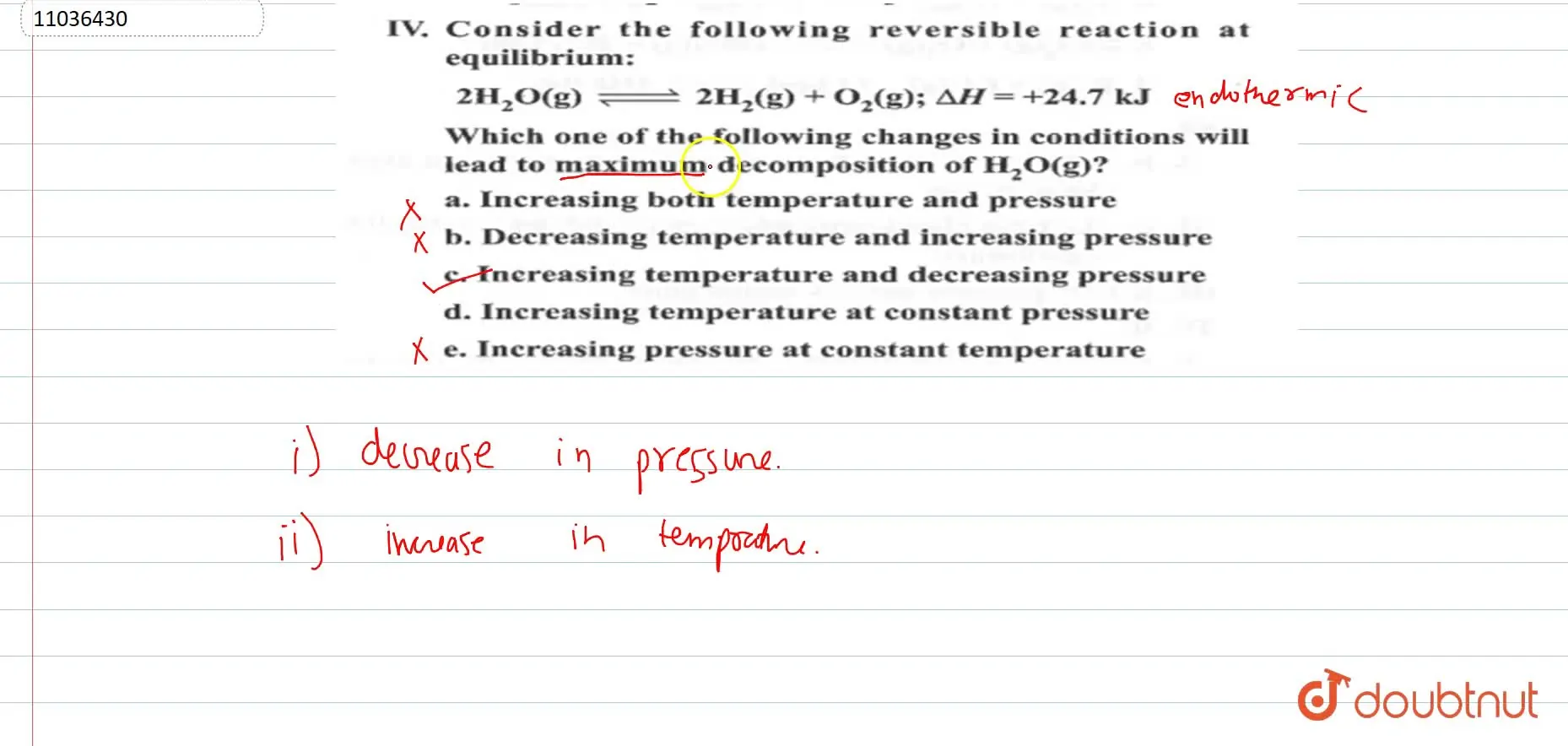Consider the following reversible reactionat equilibrium:
2H2O(g)⇔2H2(g)+O2(g),ΔH=+24.7kJ
Which one of the following changes in conditions will lead to maximum decomposition of H2O(g)?
Increasing both temperature and pressure
Decreasing temperature and increasing pressure
Increasing temperature and decreasing pressure
Increasing temperature at constant pressure
The correct Answer is:C
ΔH is positive so reaction move forward by increase in temperature & value of Δn=3−2=+1 is positive so it forward with decrease in pressure.
Related Playlists
- BOOK - A2ZCHAPTER - CHEMICAL EQUILIBRIUMEXERCISE - Degree Of Dissociation, Vapour Density And Simultaneous Equilibria20videos
CHEMICAL EQUILIBRIUM
- BOOK - A2ZCHAPTER - CHEMICAL EQUILIBRIUMEXERCISE - Section B - Assertion Reasoning18videos
CHEMICAL EQUILIBRIUM
- BOOK - A2ZCHAPTER - CHEMICAL EQUILIBRIUMEXERCISE - Application Of Equllibrium Constant (K)65videos
CHEMICAL EQUILIBRIUM
- BOOK - A2ZCHAPTER - CHEMICAL BONDING AND MOLECULAR STRUCTUREEXERCISE - Section D - Chapter End Test30videos
CHEMICAL BONDING AND MOLECULAR STRUCTURE
- BOOK - A2ZCHAPTER - CHEMICAL THERMODYNAMICSEXERCISE - Section D - Chapter End Test30videos
CHEMICAL THERMODYNAMICS
Similar Questions
Consider the following reversible reactionat equilibrium:
2H2O(g)⇔2H2(g)+O2(g),ΔH=+24.7kJ
Which one of the following changes in conditions will lead to maximum decomposition of H2O(g)?View SolutionThe heat change accompanying the reaction
2H2(g)+O2(g)→2H2O(l) :
ΔH=−136kcal is calledView SolutionConsider the following reversible reaction at equilibrium
2H2O(g)<⇒2H2(g)+O2(g),(ΔH=+24.7kJ)
What conditions will lead to maximum decomposition of H2O(g)?View SolutionWhich of the following is true for ΔH H2Ol⇔H2Og100∘C
View SolutionH2O(l)→H2O(g),ΔH=+40.7kJ
ΔH is the heat of ……………..of water.View SolutionH2O(g)→H2O(l),ΔH=−40.7kJ
ΔH is the heat of……………….of water.View SolutionIn the reaction
CO2(g)+H2(g)→CO(g)+H2O(g),
ΔH=2.8kJ
ΔH representsView SolutionWhich of the following is correct for the equilibrium of the reaction ?
C(s)+H2O(g)⇔CO(g)+H2(g)View SolutionFor the reaction,
2H2(g)+O2(g)→2H2O(g),ΔH=−573.2kJ
The heat of decomposition of water per moleView SolutionIn the reaction,
CO2(g)=H2(g)→CO(g)=H2O(g), ΔH=2.8kJ
ΔH represents :View Solution


